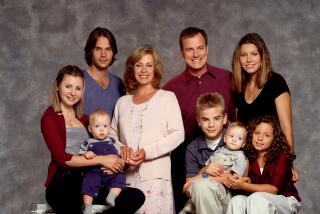It’s Not the Networks That Shy Away From Religion
- Share via
Steve Weinstein’s Nov. 24 Calendar piece (“Ratings Show Firm Belief in ‘Angel’ ”) repeats the same old tiresome canard that those in the television “establishment” dislike anything having to do with religion or “spirituality” and make a concerted effort to keep such programming from the public airwaves. To make his point, Weinstein utilizes a few strategic omissions. Amazingly, in calling the existence of God on “Touched by an Angel” “perhaps the most radical” idea on TV and making the case that “Angel” is some kind of an anomaly, Weinstein conveniently forgets the long-running “Highway to Heaven,” still playing in syndication.
This type of selective memory reminded me of a similar case last year when “L.A. Law” made a huge fuss about its newly added character, a born-again Christian. In the ensuing hoopla in the press, with cries of “what an amazing first; a sympathetic born-again Christian character as a series regular,” no one seemed to remember that “St. Elsewhere’s” writers had converted handsome lead Bruce Greenwood’s character to born-again Christianity some years earlier. In fact, “Elsewhere’s” situation was even more “radical,” as viewers had already come to know Greenwood’s character as a talented and caring doctor before his conversion, and the writers allowed the audience to follow the character’s discovery of Christianity in a way that made it seem perfectly normal. Hardly the work of anti-Christian pagans!
Television has always been quick to capitalize on a fad, even if it involves religion. Just as the “angel” fad (with books, trinkets and other merchandise) helped bring us an angel TV show, in 1978 the success of the movie “Heaven Can Wait” brought us a slew of TV tie-ins in the 1978 TV season (“Heaven on Earth,” “Almost Heaven,” etc.). These shows were also about angels helping people.
Other shows featuring religious main characters or themes (from Robert Blake’s “Hell Town” to “Father Murphy” and CBS’ discredited “documentary” on Noah’s Ark) have come and gone over the years, but the notion that the TV “elites” dislike religion persists. This theory is articulated by “Touched by an Angel” executive producer Martha Williamson, quoted in Weinstein’s piece explaining the lack of “spirituality” on TV: “The [TV] business is run by educated, intelligent, sophisticated people who, chances are, went to college and were taught that religion is uncool and a cop-out. . . .” This theory assumes that TV executives only greenlight shows that they like, as opposed to shows that they think the public will like. Does anyone in the TV biz really buy that?
If you want to seriously study why “spiritual” shows are not plentiful, check the record of the various ultra-conservative pressure groups, who routinely lead advertiser boycotts against religious shows if they fall short of these groups’ standards of “true” (read: “conservative”) Christianity. Checking the pages of some back issues of the monthly magazine of the American Family Assn., the nation’s leading religious pressure group (run by the Rev. Donald Wildmon), we find an advertiser boycott called against the CBS sitcom “Heartland” for suggesting that non-Christians go to heaven. Here’s the actual piece of a dialogue from the show, reprinted in the American Family Assn.’s Journal and cited as the reason for boycotting the show:
Son: “Do Jewish people go to heaven, too; I mean, if they’re good?”
Grandpa: “The answer is yes. Everybody that deserves to get in heaven gets in. You just be the best person you can and God takes care of the rest.”
And for this, the AFA called a boycott. Similarly, the AFA boycotted ABC’s “Moonlighting” for having an angel character make an allusion to reincarnation, the ABC sitcom “Have Faith” for showing a priest losing his temper (even though the AFA Journal admits that the priest is a sympathetic character who apologizes for yelling, the boycott was still called) and NBC’s “Night Court” for showing John Larroquette’s character praying to God in the dramatic episode in which he is feared dead after a plane crash. So please don’t blame some “elite atheist conspiracy” if TV executives shy away from stepping into the minefield of religious content.
Finally, if the public is so hungry for religious shows, why is it that televangelist Pat Robertson’s Family Channel cable network (formerly Christian Broadcasting Network) devotes only three hours of programming, during its 24 hours a day on the air, to “religious” programming (reruns of “Highway to Heaven,” “The Waltons” and Robertson’s own “700 Club”)? If this ultra-conservative “family values” advocate doesn’t think that religious shows are a good risk, why should the major networks?
More to Read
The complete guide to home viewing
Get Screen Gab for everything about the TV shows and streaming movies everyone’s talking about.
You may occasionally receive promotional content from the Los Angeles Times.






